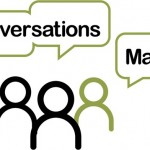
by cjxpadmin | Aug 27, 2012 | Job Search, September 2012 Magazine
by Marrisa Maldonado
The role of a manager and the role of a leader are often thought to go hand in hand. Many individuals think that in order to be a manager, you have to be a leader and vice versa, but the fact of the matter is that both positions have differences in their functionalities and in their duties. All managers have formal authority and status. Three main roles that managers assume are informal roles, interpersonal roles, and decisional roles.
The informal role of a manager concerns how they receive and relay information and how they monitor internal and external information.
Interpersonal aspects of their work include establishment and maintenance of interpersonal relations. Another aspect  of their interpersonal duties is to be a figurehead and a liaison for subordinates in a symbolic manner.
of their interpersonal duties is to be a figurehead and a liaison for subordinates in a symbolic manner.
A manager’s decisional duty includes entrepreneurship. They handle problems by turning them into opportunities, and they have to be negotiators and resource allocators.
The five major functions that managers perform are planning, organizing, command, coordinating, and control.
 When it comes to planning, a manager has to determine an organization’s goals and think of logistics and resources.
When it comes to planning, a manager has to determine an organization’s goals and think of logistics and resources.
Organizing/coordinating means that managers have to adapt and know how to integrate activities and tasks.
Command is based on a leadership function which means that it is the manager’s responsibility to direct and coordinate people and to motivate their employees.
Last but not least is the controlling function which entails monitoring the performance of their employees, correcting, implementing and reinforcing disciplinary actions, as well as keeping the organization on track.
If you are applying to a managerial position, you need to keep the responsibilities and roles that were previously listed in your mind and not take them lightly. Most people believe that if they can lead, then, that makes them a good manager, but this is not the case. The nature of managerial work is supposed to be used as a tool for the organization. Organizations are social interventions and are designed to accomplish tasks through group efforts. Managers are critical tools because managers should be able to understand and predict the behavior of people within organizations.
Basically, if you think that being a manager means separating yourself from your subordinates and interacting with them  only when you need to communicate orders, you are in for a rude awakening. I would strongly recommend that you have strong communication skills and be proficient in emotional sensitivity if your goal is to take on managerial responsibilities. When you become a manager, your popularity level will change among your co-workers. If you are a people pleaser by nature, then, I would not recommend a managerial position for you because you cannot please everyone. Part of being a manager is making tough decisions that your employees may not agree with or like. People who want and like positive feedback in exchange for their hard work should not seek out a managerial position because most of the time, no one pats you on the back and gives you positive feedback for your work when you are a manager. If you have been promoted to a managerial position or are seeking employment in this position, keep in mind that the best managers only strive to receive respect from their employees. You should always want respect from others at your job and not be too concerned with employees liking you. Remember that “respect” and “like” are two different things in any aspect of life.
only when you need to communicate orders, you are in for a rude awakening. I would strongly recommend that you have strong communication skills and be proficient in emotional sensitivity if your goal is to take on managerial responsibilities. When you become a manager, your popularity level will change among your co-workers. If you are a people pleaser by nature, then, I would not recommend a managerial position for you because you cannot please everyone. Part of being a manager is making tough decisions that your employees may not agree with or like. People who want and like positive feedback in exchange for their hard work should not seek out a managerial position because most of the time, no one pats you on the back and gives you positive feedback for your work when you are a manager. If you have been promoted to a managerial position or are seeking employment in this position, keep in mind that the best managers only strive to receive respect from their employees. You should always want respect from others at your job and not be too concerned with employees liking you. Remember that “respect” and “like” are two different things in any aspect of life.
For those of you who are applying for jobs, but are not seeking managerial positions, I have not forgotten about you. Even though you are not seeking a managerial position, you have to be conscious of what type of manager is hiring you or what type of manager you are currently working for.
Managers hold two assumptions about the nature of their employees. A Theory X manager views employees as irresponsible and lazy. These managers assume that people dislike work and will do what is possible to avoid it. They believe that employees must be coerced, threatened, or punished for them to achieve goals.
Theory Y managers hold the assumption that people are responsible and employees are generally ambitious about their work. They also believe that people have self-direction toward completing tasks and goals. Which manager would you prefer? I do not know about the rest of you, but I think that Theory Y manager is the better candidate.
Now for those of you who strive to be leaders in the work place, I commend you for your goal, but I will explain what functions a leader has and you can decide if this is for you or not. For those of you who already identify yourselves as leaders, you can decide what type of leader you are because I will discuss two types of leadership styles as well.
Leaders are individuals who facilitate a movement by a group of people toward a common goal. Leadership is a process of influence. It is important for you to remember that not all managers exercise leadership! I cannot stress that point enough. Leadership is about coping with change and establishing direction. Leaders know how to motivate people by inspiring them to overcome obstacles. In order for an organization to be effective, it needs to have strong leadership and management, but in America, there is under leading and over managing. There are a lot of leaders that have no formal authority within the workplace and there is nothing wrong with that. You tend to see this type of leadership the most in the work place. In general, most leaders have common characteristics from others which are more ambition, energy, desire to lead, self-confidence, high intelligence, and are high self-motivators. If you fit these characteristics, then, you have the makings of a leader! If you do not have any formal authority at your job, that does not mean that you cannot be a leader. In fact, I would advise you to be a leader even if you are not the boss because we need more leaders.
Now to be clear, I am not saying to overpower or undermine your boss or manager. All I am saying is to be a leader, if you want to be and let your manager do their duties, you must delegate. In the U.S., most people are transactional leaders. These leaders base their interactions by straightforward exchanges between them and their followers. If their followers perform well, the leader will reward them. The main goal of this type of leader is to keep the behavior of their followers in line with the organization’s goals.
The other type of leader is the transformational leader which is the type of leader who uses vision to instill commitment in their followers. This type of leader will make changes to an organization in order to change beliefs and attitudes of their followers. One type of leader is not better than the other. It all depends on the followers and the needs of those followers. If you are a follower, it is your personal needs that will drive you to decide which type of leader you will follow. Being a follower is not a bad thing at all because people who are leaders cannot lead if they have no followers. Leaders are not meant to be seen as individuals who can do it all, they need followers to help them carry through with their leadership. Everyone has a purpose and a part to play.
Now that you know the differences between a manager and a leader, you can decide which one you would prefer to be. Do you think it is better in the long run to be a manager or a leader? Do you think that one person can be both a manager and leader at the same time? Is your job or the one you are applying to being directed by a leader or a manager? Think about it. △

by cjxpadmin | Aug 27, 2012 | September 2012 Magazine, Uncategorized
From Ash to Ask
by Sharon Rector
Understanding How Language Can Affect Your Income
In the summer of 1971, I was afforded the opportunity to attend Baylor University’s Upward Bound Program as an incoming freshman. I had just graduated from high school with good grades and a great overall school record on my way to college and  eventually a good paying job. I never envisioned that I was about to learn a valuable and cautionary life lesson that has remained with me throughout my personal and professional life. By sharing my story, someone may reflect on how job opportunities can often hinge on their ability to speak and write effectively.
eventually a good paying job. I never envisioned that I was about to learn a valuable and cautionary life lesson that has remained with me throughout my personal and professional life. By sharing my story, someone may reflect on how job opportunities can often hinge on their ability to speak and write effectively.
That summer, the very first college course I enrolled in was a Language/Speech Class (not necessarily of a remedial nature) although economically, I was considered to be an underprivileged student, however, just a regular freshman speech class required of all incoming students. The underlying purpose of the course, in the mindset and the philosophy of the Upward Bound Program, was to give economically challenged students like me a “head start” on their pathway to a college degree and a bright financial future.
The course syllabus included students speaking in front of their peers on a variety of topics chosen by the professor. The professor’s goals were dual. First, he wanted to gauge our life experiences as well as listen to how we could openly express those experiences through speaking publicly. Simple. No problem. I knew how to speak in front of people. I had been doing that all my life!
While daydreaming in class, I inadvertently missed a couple of pertinent points in reference to the grading system of the course.  In order to stay abreast of what the professor explained to the class, I arrogantly raised my hand and bravely addressed the professor, “May I ash a question, please?” The professor who had gravitated from one side of the classroom back toward me looked stunned and gave me a stare that surely meant that I had just done something wrong. But what did I say?
In order to stay abreast of what the professor explained to the class, I arrogantly raised my hand and bravely addressed the professor, “May I ash a question, please?” The professor who had gravitated from one side of the classroom back toward me looked stunned and gave me a stare that surely meant that I had just done something wrong. But what did I say?
I was perplexed with no clue of what possibly could have caused such a reaction, but I was sure that I had done something that was not quite appropriate. He initially did not answer my question. However, immediately after class, he pulled me aside and requested that I repeat the question I had posed to him earlier. I could see that he was listening more intently, so I humbly muttered to him again, “I just wanted to ash you a question….” He stopped me immediately and thankfully, without embarrassing me any further, he calmly and compassionately explained to me that I had incorrectly pronounced the word “ask” and how it might be attributed to my cultural and social surroundings. To my astonishment, my speech professor insisted that I repeat the three-letter word every class period for weeks until I no longer mispronounced what I thought was such a simple and unassuming word.
The straightforward lesson in this story is that the manner in which we express ourselves, verbally and in writing, functions as a mirror into who we are as communicators and most importantly, who we could be as potential employees. Proper language is essential to effective communication. Without honing this skill, your message may be lost or you could be ignored entirely.
essential to effective communication. Without honing this skill, your message may be lost or you could be ignored entirely.
Most people are so familiar with their own language that there is little to no realization as to how it affects their daily lives. Language usage exemplifies how others may evaluate our belief system and values, and how well we can relay ideas, emotions, and yes, even logic. Among those evaluating you, could very well one day be a future employer who will determine your potentiality as a part of their company’s workforce and your monetary value.
In the website E-How, contributor Felicia Dyer’s “Language is the Tool,” she states that one must develop proper oral communication skills to adequately organize perceptions and develop higher order cognitive processes. She also surmises that poor language development, therefore, affects a person’s ability to be a problem-solver and to think independently.
Lera Boroditsky, author of “How Does Our Language Shape the Way We Think,” writes that the simple cognitive faculty of language could affect someone getting an education, meeting new friends, holding a job, or even starting a family.
 Recently, I took an impromptu test titled The Grammar Income Test. If you have come to this article, trying to find where you fall on the Salary Scale, I see you have also taken the test. I will get to that information shortly. This test, which is administered to college students through the University of Mottsburgh Occupational University Grammatical Knowledge, assesses and rates the correlation between grammar/language (inclusive of spelling, punctuation, capitalization, and usage skills) and a person’s potential income. According to the scale, I qualified for employment as an upper management individual. Ironically, when I retired in 2003, it was as an assistant principal of an elementary school with enrollment of approximately 1,300 students. Could this assessment be a valid indicator of how language affected my income potential? Quite possibly. Well, let’s take a look at the answers as well as the projected salary and occupational level of what you did.
Recently, I took an impromptu test titled The Grammar Income Test. If you have come to this article, trying to find where you fall on the Salary Scale, I see you have also taken the test. I will get to that information shortly. This test, which is administered to college students through the University of Mottsburgh Occupational University Grammatical Knowledge, assesses and rates the correlation between grammar/language (inclusive of spelling, punctuation, capitalization, and usage skills) and a person’s potential income. According to the scale, I qualified for employment as an upper management individual. Ironically, when I retired in 2003, it was as an assistant principal of an elementary school with enrollment of approximately 1,300 students. Could this assessment be a valid indicator of how language affected my income potential? Quite possibly. Well, let’s take a look at the answers as well as the projected salary and occupational level of what you did.
| Question |
Answer |
Correction |
| 1. Her choice will strongly effect the outcome. |
Incorrect |
Her choice will strongly affect the outcome. |
| 2. We have alot of work to do |
Incorrect |
We have a lot of work to do. |
| 3. Mottsburgh is a very busy industrial city, thousands of cars and trucks move through it every day. |
Incorrect |
Mottsburg is a very busy industrial city; thousands of cars and trucks move through it every day. |
| 4. “I suppose”, she remarked “that success comes only with time.” |
Incorrect |
“I suppose,” she remarked “that success comes only with time.” |
| 5. The company should receive the package tomorrow. |
Correct |
|
| 6. Its impressive to hear what she has done. |
Incorrect |
It’s impressive to hear what she has done. |
| 7. She was late, however, she did make the presentation. |
Incorrect |
She was late; however, she did make the presentation. |
| 8. Give the book to whom? |
Correct |
|
| 9. When the ship arrives we can begin the journey. |
Incorrect |
When the ship arrives, we can begin the journey. |
| 10. We rafted down the grand mountain river. |
Incorrect |
We rafted down the Grand Mountain River. |
| 11. The name of the book was “Outbreak.” |
Incorrect |
The name of the book was “Outbreak.” |
| 12. There were four in the group: Ann, Jim, Theo, and Amanda. |
Correct |
|
| 13. He sings good. |
Incorrect |
He sings well. |
| 14. You shouldn’t lie on the wet grass. |
Correct |
|
| 15. He paid all the interest on the principal. |
Correct |
|
| 16. I wish to go irregardless of his decision. |
Incorrect |
I wish to go, regardless of his decision. |
| 17. He doesn’t know history very well. As you can see from his answers in class. |
Incorrect |
He doesn’t know history very well, as you can see from his answers in class. |
| 18. He imagined that Hawking would have all the answers but he just posed more questions. |
Incorrect |
He imagined that Hawking would have all the answers, but he just posed more questions. |
| 19. Spiraling in the Andromeda Galaxy, Dr. Vilhelm insists that there is alien life on the Andromeda planet called Lanulos. |
Incorrect |
I really don’t know why this statement is incorrect, other than Lanulos is considered an imaginary planet. Can anyone help with this? |
| 20. We packed all of our luggage, then we were on our way to the airport. |
Incorrect |
We packed all of our luggage, then, we were on our way to the airport. |
Now for the salary part. This is where you discover that your answers can determine your salary capacity and occupational level. Take a look at this.
| # WRONG |
PROJECTED SALARY |
OCCUPATIONAL LEVEL |
| 0 to -4 |
$150,000 and above |
Top Executive |
| -5 to -6 |
$90,000 to $150,000 |
Upper Management |
| -7 to -8 |
$60,000 to $90,000 |
Key Personnel |
| -9 to -12 |
$25,000 to $60,000 |
Semi-Skilled |
| -13 to -18 |
$10,000 to $25,000 |
Unskilled |
| -20 or more |
$0 to $10,000 |
Unemployable |
As an assistant principal, I witnessed numerous interviews where potential employees used a colloquial such as “ain’t” or mispronounced the word “children” and replaced it with the word “chilren”, or incorrectly used punctuation or verb usage on their resumes. In the eyes of the school administration, these errors were unforgivable and no three-piece suit or well-manicured hairstyle could overcome the damage. Therefore, these applicants were almost always deemed not qualified, a bad hire, or potentially unemployable.
The thesis of the Grammar Income Test was a very simplistic one. Individuals who make such errors and mistakes in oral and written presentations are often viewed as not intelligent, or maybe incompetent, and usually such articulation errors are indicative of a lack of social and educational maturity. Such subtleties can result in prejudices against you and could keep you from getting the job and income you deserve.
The reality is that some people believe that they are just not adept at learning to speak correctly. Then there are some who do not realize their grammatical errors until it’s too late. Be very cognizant not to de-emphasize your communication skills by keeping the following points in mind.
- Never use colloquial language or slang. No matter how relaxed the atmosphere might be, you never know what subtleties a potential employer may be targeting.
- When preparing your resume always spell check, then edit, spell check, and edit again. People sometimes have the
 propensity to write in the same mode as they speak. Keep in mind that incorrect language is still incorrect language, whether it’s oral or written.
propensity to write in the same mode as they speak. Keep in mind that incorrect language is still incorrect language, whether it’s oral or written.
- Know the company to which you are applying. Know the company “buzz” words. Know how to pronounce those words and make sure you know what those words mean.
- Speak clearly and decisively. Don’t add words that you are unsure of and by all means, keep it simple and direct.
- Practice responses to possible questions. If you have researched the company and know the position you are applying for, you should have an idea of questions that could potentially be asked of you.
- Critique yourself. If it doesn’t sound correct to you, it won’t sound correct to your audience. Listen to yourself speak in front of a mirror. Sometimes, you can be your own best critic.
Much time has passed and it’s been quite a successful journey since the days of ash to ask. I stand in amazement on the impact of one moment in time and the empathy of a caring college professor who made me aware of how mispronouncing a simple three-letter word could have negatively changed my life. In retrospect, he unknowingly did me a favor that lasted a lifetime. I leave you with this story to ponder and a notable quote from English Philosopher Ludwig Wittgenstein (1889).
“The limits of my language mean the limits of my world.”
NOTE: Just a small note regarding the Grammar Income Test. This test was a bit fabricated. However, the concept of the test is very real.
Every day individuals who make grammatical errors are victims of a pervasive but seldom discussed prejudice. People assume that those who make frequent grammatical errors are unintelligent, not very knowledgeable, and incompetent. None of this may be true. Language habits are more indicative of social background than education and ability. However, any business executive will support the notion that grammatical skill directly affects promotion. So, the idea behind the Grammar Income Test is valid, although the scored income level may not be. △

by cjxpadmin | Aug 27, 2012 | September 2012 Magazine
By Sheena Williams
Facebook, LinkedIn, Twitter, bloggers are all social media sites. Let me reiterate, they are social media sites. If you break those three words down, it means a site that uses media for you to be social. You can share  pictures, thoughts, songs, and videos to let others know what you’re doing with and in your life. It can let you keep up with literally hundreds of people with a click of a button. If you have family in Aruba, you just have to log on to see if that hurricane missed them. Have a daughter in the army? Well, your Facebook can bring you that much closer to seeing her.
pictures, thoughts, songs, and videos to let others know what you’re doing with and in your life. It can let you keep up with literally hundreds of people with a click of a button. If you have family in Aruba, you just have to log on to see if that hurricane missed them. Have a daughter in the army? Well, your Facebook can bring you that much closer to seeing her.
With all of the convenience of social media, it isn’t any wonder that many companies have now jumped on the bandwagon! Not only do they do this to advertise their product or service, but to conduct hiring practices. Think about all of the information that is on your resume can now be on LinkedIn. Employers can screen you, get your email address or telephone number, and hire you within a matter of minutes!
Unfortunately, however, with the good, comes the bad. You’re a conservative? Guess what? Your future boss  may be a liberal. Don’t like chicken soup? Well, the office administrator in charge of hiring may love it and thinks that anyone who doesn’t like it is un-American! With these kinds of pitfalls, someone could easily fall through, so, it’s easy to just say “Forget social media altogether.” However, more and more jobs are requiring a Facebook account or some such application. People are losing out on jobs because the employers cannot connect with them. You didn’t hear about that job on 4th Street? That’s because the company released the information on Twitter instead of spending the money for that pricey ad in the newspaper. In an effort to keep you from ignoring the job networking power house that is Social Media, we are going to give you some rules of thumb to follow when working with and posting on the World Wide Web!
may be a liberal. Don’t like chicken soup? Well, the office administrator in charge of hiring may love it and thinks that anyone who doesn’t like it is un-American! With these kinds of pitfalls, someone could easily fall through, so, it’s easy to just say “Forget social media altogether.” However, more and more jobs are requiring a Facebook account or some such application. People are losing out on jobs because the employers cannot connect with them. You didn’t hear about that job on 4th Street? That’s because the company released the information on Twitter instead of spending the money for that pricey ad in the newspaper. In an effort to keep you from ignoring the job networking power house that is Social Media, we are going to give you some rules of thumb to follow when working with and posting on the World Wide Web!
Are you ready?
Create yourself a separate account or page for work purposes. Yes, I know, you already have a  Facebook/LinkedIn/Twitter page. But do yourself a very large favor and create another one with your work e-mail address that you can keep completely separate from your personal social media page. This not only allows you to get your face and resume out there, but it also allows you to post freely on your personal page without having your boss seeing you do the Captain Morgan pose in front of their building. As funny as it may be, the picture has a time stamp on it and now you and your boss know that your picture was not taken during your lunch break.
Facebook/LinkedIn/Twitter page. But do yourself a very large favor and create another one with your work e-mail address that you can keep completely separate from your personal social media page. This not only allows you to get your face and resume out there, but it also allows you to post freely on your personal page without having your boss seeing you do the Captain Morgan pose in front of their building. As funny as it may be, the picture has a time stamp on it and now you and your boss know that your picture was not taken during your lunch break.
Learn the Terminology
Your boss asks why you don’t post anything on your Twitter. What? You have a Twitter and you were supposed to post? What is a post? Okay, so you’re creating the requested post. It tells you that you put in too  many characters. What are characters? It’s little things like these that you will need to look into that will make your time on any social media site easier before you even log on. A little research will let you know that a post is the content that you put on your social media page. You’ll find out that characters are the words, letters, numbers, and spaces that fill up a post. Being savvy about the things that you are about to undertake before you get on with it, will make your day a lot easier.
many characters. What are characters? It’s little things like these that you will need to look into that will make your time on any social media site easier before you even log on. A little research will let you know that a post is the content that you put on your social media page. You’ll find out that characters are the words, letters, numbers, and spaces that fill up a post. Being savvy about the things that you are about to undertake before you get on with it, will make your day a lot easier.
Securities Securities are what you allow others to see when they come to your page. You don’t mind letting John Doe check out your daily posts, but Jane Smith seems a bit suspicious. With many social media sites, you have the power to block, hide, allow, un allow, and show only who or what you wish to share. Maybe you took some before and after pictures of your weight loss journey, but you don’t want others to see your progress before your high school reunion. Set the picture folder to private and only your friends and family can see it. Going to the hospital to have a very personal surgery? Make sure that your securities reflect those who you want to see it. We always recommend that if it is something private like the previous example that you don’t put it up on your media site. Call those you need to know that information so that it will stay private.
Know What To Post
In life, you will find that not everyone will agree. In fact, in much of life, you will find that not everyone will agree. You have every right to post your opinion on any given topic that you see fit. However, by putting it on a social media site, you are giving everyone you have allowed access to your page to view and talk about it and come back with a rebuttal. If you are hoping to have a future employer hire you based on your information, then, you will have to keep the information you post to a minimum. Nothing negative, political, religious, racist or generally too opinionated should go onto your page. You want employers to base their decision to hire you based on your work, not how you feel about the Red Sox losing that big game.
come back with a rebuttal. If you are hoping to have a future employer hire you based on your information, then, you will have to keep the information you post to a minimum. Nothing negative, political, religious, racist or generally too opinionated should go onto your page. You want employers to base their decision to hire you based on your work, not how you feel about the Red Sox losing that big game.
Be Choosy About Who You Allow On Your Page
You love your Aunt Gertrude. You want nothing but good things and happy days for your Aunt Gertrude.  However, Auntie G has a bad habit of telling really embarrassing baby stories about you on your page. Your best friend, Buddy, has a nasty habit of criticizing you on your page. Your social media page is not the place for him or Aunt G to be doing any of that. Maybe it’s not even a case of you doing anything. Maybe Jessica likes to take provocative pictures of herself next to a car. It may be innocent, but if she tags you on the pictures, they will show up on your page, and it’s not something your employer needs to see. Don’t ignore any of these people, by any means. If you followed the above directions and have two separate pages, then, put them on the personal page and move on… except for that friend who criticizes you, having toxic people in your life isn’t good, no matter how funny he is, posting those pictures of those crazy kittens.
However, Auntie G has a bad habit of telling really embarrassing baby stories about you on your page. Your best friend, Buddy, has a nasty habit of criticizing you on your page. Your social media page is not the place for him or Aunt G to be doing any of that. Maybe it’s not even a case of you doing anything. Maybe Jessica likes to take provocative pictures of herself next to a car. It may be innocent, but if she tags you on the pictures, they will show up on your page, and it’s not something your employer needs to see. Don’t ignore any of these people, by any means. If you followed the above directions and have two separate pages, then, put them on the personal page and move on… except for that friend who criticizes you, having toxic people in your life isn’t good, no matter how funny he is, posting those pictures of those crazy kittens.
Do Not Post Your Personal Business
I cannot stress enough that it is potentially dangerous for you to put seriously personal things on your page. No one needs to know that your husband cheated on you. No one needs to know that you were chatting up some hottie on websites with questionable names. For the love of all that is heavenly, do not fight with your significant other on Facebook. As stated earlier, you are posting to a social media site. Yes, it is your business what you post there, but by posting it there, you open yourself up to criticism, complaints and judgment from all who can see your post, including your future boss. Your words can be used against you in a court of law, and there have been custody battles won on things posted on social media sites, don’t think I’m kidding. Think of social media as an interactive diary. You post your personal thoughts, but instead of the thoughts just being kept, the pages respond back to you.
what you post there, but by posting it there, you open yourself up to criticism, complaints and judgment from all who can see your post, including your future boss. Your words can be used against you in a court of law, and there have been custody battles won on things posted on social media sites, don’t think I’m kidding. Think of social media as an interactive diary. You post your personal thoughts, but instead of the thoughts just being kept, the pages respond back to you.
Don’t Be Afraid Of Social Media. It’s meant as entertainment and can be an excellent tool for finding work. It allows you to network and meet new people whom you wouldn’t have otherwise had the opportunity to meet. Just practice caution and some good common sense and you will be fine! △


by cjxpadmin | Aug 1, 2012 | August 2012 Magazine, This Issue's FEATURE
Am I Too Old To Change Careers?
You said you want to change your career at this stage of the game? Well, let me tell you that you are never too old.
Today, most of us are finding ourselves having to work much longer than we ever imagined. The days of an early retirement have been thrown out the window, so to  speak. However, working in our later years provides an opportunity to re-invent ourselves, to re-discover our hidden talents, and to pursue new ventures. This time in our lives gives us the chance to pursue the dreams that were left untapped, those things that we really wanted to do, but couldn’t because you all of a sudden find yourself with a family and obligations. Now, we are much wiser, have a lot of experience, and have gained skills that can be utilized by an employer or by yourself to start your own business. We should, after all, be challenging ourselves.
speak. However, working in our later years provides an opportunity to re-invent ourselves, to re-discover our hidden talents, and to pursue new ventures. This time in our lives gives us the chance to pursue the dreams that were left untapped, those things that we really wanted to do, but couldn’t because you all of a sudden find yourself with a family and obligations. Now, we are much wiser, have a lot of experience, and have gained skills that can be utilized by an employer or by yourself to start your own business. We should, after all, be challenging ourselves.
According to the Kingston Business School, older entrepreneurs are more likely to be successful than their younger counterparts. Why? Because the older we get, we become more confident about our own self-worth and are more aware of our strengths and weaknesses. This is a major advantage over a young person fresh out of college who is pursuing their first career. Working for yourself allows you to become dependent on yourself versus solely relying on others to give you a job.
Even if you aren’t interested in starting your own business, use this time in your life to re-assess your career and identify the areas that you truly enjoyed. Evaluate your life and job experiences and find the direction you want your career to take.
 The Colonel Sanders Story has been told so many times. It’s a well known story. Colonel Sanders was 65 years old when he began franchising his infamous chicken. Prior to that, the Colonel was a gas station owner where he fried chicken for weary travelers. This story is often repeated to show that it’s never too late and one is never too old to come up with career changing ideas. However, things were different in the 1930’s. When Colonel Sanders starting serving fried chicken at a Kentucky gas station 80 years ago, he probably didn’t have as many health department hurdles to overcome as that same gas station would today. How do you know what you want to do?
The Colonel Sanders Story has been told so many times. It’s a well known story. Colonel Sanders was 65 years old when he began franchising his infamous chicken. Prior to that, the Colonel was a gas station owner where he fried chicken for weary travelers. This story is often repeated to show that it’s never too late and one is never too old to come up with career changing ideas. However, things were different in the 1930’s. When Colonel Sanders starting serving fried chicken at a Kentucky gas station 80 years ago, he probably didn’t have as many health department hurdles to overcome as that same gas station would today. How do you know what you want to do?
CareerPath.com offers online resources that determines the same answers for free. If someone wants to change careers but is having trouble deciding on a new career path, these online resources can really help. Also, the website will even suggest actual jobs worth applying for.
Always remember that there are ways to transfer the skills you have gained so far into your next career. This is your opportunity to establish your real passions, interests, strengths and goals into your next career. However, do not forget what you have achieved or accomplished so far. None of it is irrelevant. You are simply building and growing from what you have done, even if you are taking a slightly different direction now. There is a connection there; — you just need to find it.
strengths and goals into your next career. However, do not forget what you have achieved or accomplished so far. None of it is irrelevant. You are simply building and growing from what you have done, even if you are taking a slightly different direction now. There is a connection there; — you just need to find it.
No one ever stated that we were only allowed one career path. It’s never too late to make a change. Start now. Don’t focus on your age but rather on the skills and experience you are able to offer to others. Empower yourself with this knowledge and pursue your new career path.
Choose a new you! △
“When you’re finished changing, you’re finished.”
~Benjamin Franklin

by cjxpadmin | Aug 1, 2012 | August 2012 Magazine
PREPARING FOR THE INTERVIEW
It’s a known fact that employers hire people they like, people who they can relate to or who they seem are like them somehow. Because of this, first and foremost, be likable and create a good first impression on your interview. P E O P L E get hired — experience alone does not!
The following list can help you prepare for your interview. Pay close attention and give your best interview.
 Place and time of interview: make sure you know it! Try to be there early, about 10-15 minutes early. Next, know your interviewer’s full name (the correct pronunciation as well) and his or her title.
Place and time of interview: make sure you know it! Try to be there early, about 10-15 minutes early. Next, know your interviewer’s full name (the correct pronunciation as well) and his or her title.
 Research the company. Learn everything you can about the company you are trying to get into. Learn its principal line of business, locations and yes, even annual sales revenue.
Research the company. Learn everything you can about the company you are trying to get into. Learn its principal line of business, locations and yes, even annual sales revenue.
 Envision why the hiring manager or the human resource person is interested in your qualifications.
Envision why the hiring manager or the human resource person is interested in your qualifications.
 Plan on how this opportunity could impact your immediate situation as well as your long-term career development. What can it do for your family?
Plan on how this opportunity could impact your immediate situation as well as your long-term career development. What can it do for your family?
 Always remember that an interview is a “two-way street.” Know what questions to ask. Insightful questions help both you and the interviewer to see if your relationship will be mutually rewarding.
Always remember that an interview is a “two-way street.” Know what questions to ask. Insightful questions help both you and the interviewer to see if your relationship will be mutually rewarding.
 Realize that the better you understand the opportunity at hand, the more you will be able to communicate your interest in the position. It will also help you ask better questions with regard to the job.
Realize that the better you understand the opportunity at hand, the more you will be able to communicate your interest in the position. It will also help you ask better questions with regard to the job.
 Enthusiastic smile and firm handshake are two things with which to greet your interviewer. Always wear proper attire and always, always put your best foot forward!
Enthusiastic smile and firm handshake are two things with which to greet your interviewer. Always wear proper attire and always, always put your best foot forward!
CHART OF DO’S AND DON’TS
| SOME DO’S |
SOME DON’TS |
| 1. DO plan to arrive on time or even a few minutes early. |
- DON’T arrive late for a job interview. Late arrivals are never excusable.
|
| 2. DO fill out your application neatly and completely. |
2. DON’T leave any blank spaces and DON’T rely on your resume to do the selling for you. |
| 3. DO greet the interviewer by his/her name using the correct pronunciation of their name. |
3. DON’T mispronounce his/her name. If you are unsure of it, ask the employer to repeat it. |
| 4. DO give the appearance of energy as you walk into the interviewing area. |
4. DON’T stroll into the room lazily. Smile! Firm Handshake! Be genuinely glad to be there. |
| 5. DO wait until you are offered a chair before sitting. |
5. DON’T just sit down before the interviewer. Sit up straight, be alert and look interested. |
| 6. DO be a good listener as well as a good communicator. |
6. DON’T appear bored and disinterested. Pay attention when spoken to and ask questions. |
| 7. DO look a prospective employer in the eye at all times. |
7. DON’T look away during a conversation. Maintaining eye contact shows confidence. |
| 8. DO follow the interviewer’s leads. |
8. DON’T go off on your own tangent. |
| 9. DO make sure that your good points come across to the interviewer in a factual, sincere manner. |
9. DON’T come across as egotistical, but do stress your experience, skills, abilities and achievements. |
| 10. DO always conduct yourself as if you are determined to get the job you are discussing. |
10. DON’T underestimate yourself. Never close the door on opportunity. |
| 11. DO show enthusiasm. |
11. DON’T appear blasé, nonchalant or bored. |
| 12. DO bring along at least 2-3 copies of your resume. |
12. DON’T forget to bring your resume in a neat and presentable manner. |
| 13. DO politely refuse an offer of a cigarette. |
13. DON’T smoke, even if the interviewer does and by no means, DO NOT chew gum! |
| 14. DO explain, whenever possible, any questions asked of you. |
14. DON’T respond with a simple yes or no. Give a good answer without going overboard. |
| 15. DO tell the truth. |
15. DON’T lie. Be truthful and frank. |
| 16. DO be considerate of past or present employers. |
16. DON’T make derogatory remarks of past employers. Not a good idea! |
| 17. DO answer questions politely and completely. |
17. DON’T over-answer. Stay away from politics or controversial issues. |
| 18. DO keep questions about salary and vacations to yourself. |
18. DON’T inquire about salary, vacation, bonuses, etc. on the initial interview. |
This next chart is just a brief reminder of Dressing For Success!
| Women |
Men |
| Conservative dress or suit |
If wearing suit, choose navy, gray or charcoal. |
| Avoid open-toe or sling back shoes |
Black leather shoes, polished please! |
| Conservative jewelry and perfume |
Minimal jewelry and minimal cologne |
| Hair neatly combed and not hanging in face |
Conservative haircut |
Now, it is time to check yourself and give yourself the once over right before your interview.
INTERVIEWING CHECKLIST
| Question |
✔ |
| 1. How is my physical appearance? |
✔ |
| 2. How self-assured and confident do I seem? |
✔ |
| 3. Can I communicate effectively during my interview? |
✔ |
| 4. Can I represent a return on my employer’s total investment in my pay and benefits if I am hired? |
✔ |
| 5. What are some specific examples of my achievements at work? |
✔ |
| 6. How much knowledge of the industry do I have? |
✔ |
| 7. How much do I know about my potential employer’s company? |
✔ |
| 8. Can I demonstrate with concrete examples my maturity and readiness to take on this responsibility? |
✔ |
| 9. Do I have the desire and enthusiasm to learn and grow with this company? |
✔ |
| 10. Am I exhibiting a positive attitude toward management and co-workers? |
✔ |
| 11. Am I demonstrating enough commitment and involvement in doing more than the job requires? |
✔ |
| 12. Do I understand the technical language and practices of the industry? |
✔ |
I hope these tips help you in the preparation of your interview.
Check next month and we will discuss the actual interview process itself and things to remember. Also watch for tips on the particular closing of the interview. △

 of their interpersonal duties is to be a figurehead and a liaison for subordinates in a symbolic manner.
of their interpersonal duties is to be a figurehead and a liaison for subordinates in a symbolic manner. When it comes to planning, a manager has to determine an organization’s goals and think of logistics and resources.
When it comes to planning, a manager has to determine an organization’s goals and think of logistics and resources. only when you need to communicate orders, you are in for a rude awakening. I would strongly recommend that you have strong communication skills and be proficient in emotional sensitivity if your goal is to take on managerial responsibilities. When you become a manager, your popularity level will change among your co-workers. If you are a people pleaser by nature, then, I would not recommend a managerial position for you because you cannot please everyone. Part of being a manager is making tough decisions that your employees may not agree with or like. People who want and like positive feedback in exchange for their hard work should not seek out a managerial position because most of the time, no one pats you on the back and gives you positive feedback for your work when you are a manager. If you have been promoted to a managerial position or are seeking employment in this position, keep in mind that the best managers only strive to receive respect from their employees. You should always want respect from others at your job and not be too concerned with employees liking you. Remember that “respect” and “like” are two different things in any aspect of life.
only when you need to communicate orders, you are in for a rude awakening. I would strongly recommend that you have strong communication skills and be proficient in emotional sensitivity if your goal is to take on managerial responsibilities. When you become a manager, your popularity level will change among your co-workers. If you are a people pleaser by nature, then, I would not recommend a managerial position for you because you cannot please everyone. Part of being a manager is making tough decisions that your employees may not agree with or like. People who want and like positive feedback in exchange for their hard work should not seek out a managerial position because most of the time, no one pats you on the back and gives you positive feedback for your work when you are a manager. If you have been promoted to a managerial position or are seeking employment in this position, keep in mind that the best managers only strive to receive respect from their employees. You should always want respect from others at your job and not be too concerned with employees liking you. Remember that “respect” and “like” are two different things in any aspect of life.






















